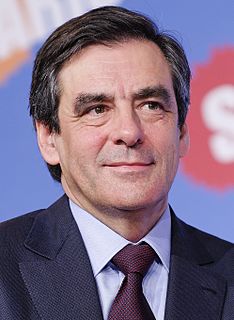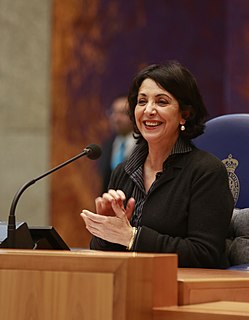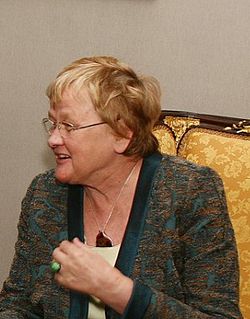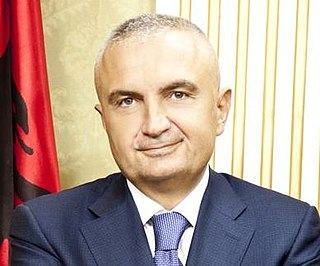
An electoral college is a set of electors who are selected to elect a candidate to a particular office. Often these represent different organizations, political parties, or entities, with each organization, political party or entity represented by a particular number of electors or with votes weighted in a particular way. The system can ignore the wishes of a general membership.

The National Assembly is the lower house of the bicameral Parliament of France under the Fifth Republic, the upper house being the Senate. The National Assembly's members are known as députés.

The President of the Czech Republic is the elected formal head of state of the Czech Republic and the commander-in-chief of the Military of the Czech Republic. Unlike counterparts in other Central European countries such as Austria and Hungary, who are generally considered figureheads, the Czech president has a considerable role in political affairs. Because many powers can only be exercised with the signatures of both the President and the Prime Minister of the Czech Republic, responsibility over some political issues is effectively shared between the two offices.

France is a representative democracy. Public officials in the legislative and executive branches are either elected by the citizens or appointed by elected officials. Referendums may also be called to consult the French citizenry directly on a particular question, especially one which concerns amendment to the Constitution.
Regular elections in Albania are mandated by the Constitution and legislation enacted by Parliament. The Parliament (Kuvendi) has 140 members elected for four-year terms. The electoral system is closed list proportional representation. There are 12 multi-member constituencies corresponding to the country's 12 administrative regions. Within any constituency, parties must meet a threshold of 3 percent of votes, and pre-election coalitions must meet a threshold of 5 percent of votes.

The Italian Parliament is the national parliament of the Italian Republic. The Parliament is the representative body of Italian citizens and is the successor to the Parliament of the Kingdom of Sardinia (1848–1861) and the Parliament of the Kingdom of Italy (1861–1946). It is a bicameral legislature with 945 elected members and a small number of unelected members (parlamentari). It is composed of the Chamber of Deputies, with 630 members (deputati) elected on a national basis, and the Senate of the Republic, with 315 members (senatori) elected on a regional basis, plus a small number of senators for life, either appointed or ex officio. The two houses are independent from one another and never meet jointly except under circumstances specified by the Constitution.
Deputy mayor is an elective or appointive office of the second-ranking official in many local governments.

A national general election was held in Italy on 13 May 2001 to elect members of the Chamber of Deputies and the Senate of the Republic. The 14th Parliament of the Italian republic was chosen.

The French legislative elections took place on 10 June and 17 June 2007 to elect the 13th National Assembly of the Fifth Republic, a few weeks after the French presidential election run-off on 6 May. 7,639 candidates stood for 577 seats, including France's overseas possessions. Early first-round results projected a large majority for President Nicolas Sarkozy's UMP and its allies; however, second-round results showed a closer race and a stronger left. Nevertheless, the right retained its majority from 2002 despite losing some 40 seats to the Socialists.

The Left, also commonly referred to as the Left Party, is a democratic socialist political party in Germany. It is considered to be left-wing populist by some researchers. The party was founded in 2007 as the result of the merger of the Party of Democratic Socialism (PDS) and the Electoral Alternative for Labour and Social Justice (WASG). Through the PDS, the party is the direct descendant of the ruling party of the former East Germany (GDR), the Socialist Unity Party of Germany (SED).
The Centrists, formerly known as New Centre and European Social Liberal Party, is a centre-right political party in France formed by the members of the Union for French Democracy (UDF) – including 18 of the 29 members of the UDF in the National Assembly) – who did not agree with François Bayrou's decision to found the Democratic Movement (MoDem) and wanted to support the newly elected president Nicolas Sarkozy, continuing the UDF-Union for a Popular Movement (UMP) alliance.

The 1820 general election organized the second legislature of the Second Restoration. The election was held on 4 and 13 November.

Cantonal elections to elect half the membership of the general councils of France's 100 departments were held on 9 and 16 March 2008. These elections coincided with the municipal elections, in which the left did well.

A presidential election was held in France on 22 April 2012, with a second round run-off held on 6 May to elect the President of France. The incumbent Nicolas Sarkozy was running for a second successive and, under the terms of the constitution, final term in the election.

The Speaker of the House of Representatives is one of the 150 members of the House of Representatives of the Netherlands, elected to lead the meetings of the House. They are also chairing the Presidium and the Procedure Committee. Prior to the 1982 constitutional revision, the Speaker was appointed by the Crown.

Estonian presidential elections, 2006 took place over four rounds, which were held on 28 and 29 August, and 23 September 2006. The first three rounds of the presidential election were held within the Riigikogu, which is Estonia's Parliament, as specified under electoral law. The two top candidates, Ene Ergma and Toomas Hendrik Ilves, were not elected because they did not obtain the required two-thirds of the votes in the Riigikogu.

Parliamentary elections were held in Haiti on 9 August 2015, with a second round planned initially on 25 October. Two-thirds of the Senate and all members of the Chamber of Deputies were up for election.

Indirect presidential elections were held in Albania on 19, 20, 27 and 28 April 2017, the eighth such elections since the collapse of the communist regime in 1991. In the first through third round, no candidates were proposed and no vote took place in the Parliament of Albania. In the fourth round, the incumbent Chairperson and then-Prime Minister of Albania, Ilir Meta was elected as the eighth President of Albania with almost 87 votes.

The November 2010 San Diego general elections were on November 2, 2010, in San Diego, California. A two-round system was used for the election, starting with a June primary election followed by a November runoff election between the top-two candidates if no candidate received a majority of the votes in the first round.



















